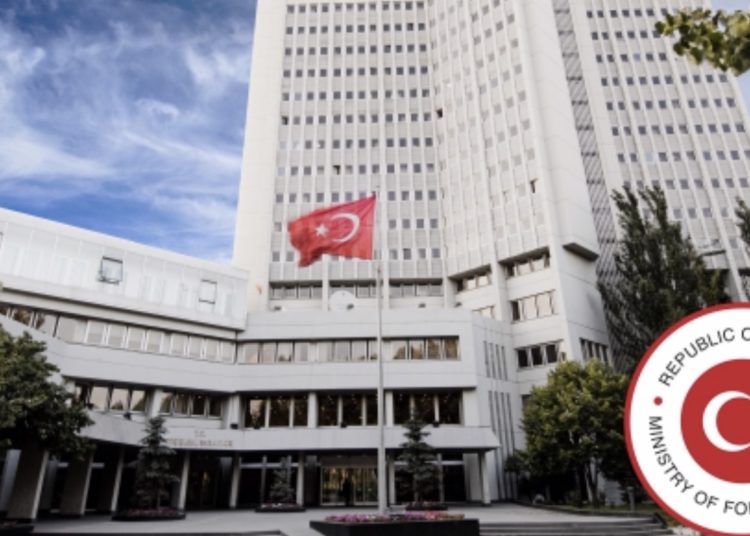Turkish embassies and consular officials engaged in spying on government critics in foreign countries as part of profiling and espionage activities that at times amounted to a systematic and deliberate campaign of refugee spying, a new document has revealed.
The document, annexed to a court case in Turkey and obtained by Nordic Monitor, reveals a long list of surveillance and monitoring that targeted institutions affiliated with members of the Gülen movement, a vocal critic of the Recep Tayyip Erdogan regime in Turkey.
According to papers released by the Ankara 4th High Criminal Court on Jan. 16, 2019 in case No. 2016/238, the Turkish Foreign Ministry had compiled a long list of foreign entities that were owned and/or operated by people who are seen as close to the movement.
In document numbered 8211250 sent to the prosecutor’s office on Aug. 21, 2015 and incorporated into the evidentiary file as exhibit number 2, the ministry acknowledged it had collected information in many countries in the Americas, Europe, Asia and Oceania.
The following African countries were listed: Burkina Faso, Equatorial Guinea, Ethiopia, Morocco, Gabon, Ghana, Guinea-Bissau, South Africa, Cameroon, Kenya, Democratic Republic of the Congo, Libya, Madagascar, Mali, Egypt, Mauritania, Mozambique, Niger, Nigeria, Central African Republic, Senegal, Somalia, Sudan, Tanzania, Tunisia and Uganda.
The Turkish Foreign Ministry listed the following places in the United States where it ran the monitoring operation: Alabama, Arizona, Arkansas, Boston, California, Colorado, Florida, Georgia, Houston, Indiana, Louisiana, Las Vegas, Los Angeles, Minnesota, Missouri, Nevada, New Jersey, New Mexico, New York, North Carolina, Ohio, Oklahoma, Pennsylvania, San Antonio, Chicago, Tennessee, Texas, Utah, Washington and San Diego.

In the Americas, Argentina, Ecuador, Canada, Mexico, Panama, Peru, Chile, and Venezuela were listed by the Turkish diplomats who worked on the surveillance of government critics.
The countries listed in Asia are Afghanistan, Bangladesh, the United Arab Emirates, China, Indonesia, Philippines, South Korea, Georgia, India, Iraq, Japan, Cambodia, Kazakhstan, Kyrgyzstan, Malaysia, Mongolia, Myanmar, Pakistan, Russia, Singapore, Sri Lanka, Saudi Arabia, Tajikistan, Thailand, Jordan and Vietnam.
The surveillance covered following European countries: Germany, Albania, Austria, Belgium, Bosnia and Herzegovina, Bulgaria, Czech Republic, Denmark, France, Finland, Croatia, Netherlands, the United Kingdom, Sweden, Kosovo, Latvia, Lithuania, Luxembourg, Hungary, Macedonia, Moldova, Norway, Poland, Portugal, Romania, Slovenia, Serbia and Ukraine,
Australia and New Zealand were also added to the long list of places where illegal surveillance was run by the Turkish government.
Unlawful profiling activities conducted by the Turkish government that amounted to espionage even in friendly countries were confirmed by extensive coverage in the Swedish media and corroborated by the former Turkish ambassador in Stockholm.
“I personally find it only natural that the Turkish state is of course interested in such activities if they are in Sweden,” Kaya Türkmen, the then-Turkish ambassador to Sweden, said in 2016 in an interview with Swedish Radio. He said he did not believe Turkey was violating Swedish law, claiming that “every state has the right to collect information on activities that are directed against it even if it’s on individuals living in Sweden.”
The profiling of and spying on critics has had repercussions for Turks as well as non-Turks. Based on profiling lists, people were arrested, investigated and even prosecuted in Turkey. Having worked as a teacher in schools run by the Gülen movement abroad or sending children to those schools is considered to be an act of terrorism by the Erdogan government.
When the expansive profiling activity was exposed in 2017, Swedish Foreign Minister Margot Wallström contacted Ambassador Türkmen and expressed Swedish government concerns over the profiling of critics of the Turkish government and the espionage scandal.
According to a report by Süddeutsche Zeitung with the NDR and WDR television stations in March 2017, Turkey’s National Intelligence Organization (MİT) had prepared a list of 300 Turks and 200 schools, associations and organizations that were connected to the Gülen movement in Germany. The list included addresses, telephone numbers and photos of the people.
The report also said German authorities started to warn people who were on the MİT list. Both the intelligence agency and the police took on the responsibility of informing Gülen movement sympathizers about the MİT surveillance.
Turkey’s top religious authority, the Directorate of Religious Affairs (Diyanet), and its affiliates abroad were also involved in unlawful surveillance and intelligence gathering activity. Imams who were working for Diyanet’s German affiliate DİTİB faced investigations by German authorities due to allegations made against them. In 2017, German police teams raided the apartments of four DİTİB imams in North Rhine-Westphalia and Rhineland-Palatinate who were suspected of acting as informants.
The Federal Public Prosecutor’s Office (GBA) said in a statement that the imams had acted on an order issued on Sept. 20, 2016 by the directorate to profile Gülen movement sympathizers.












